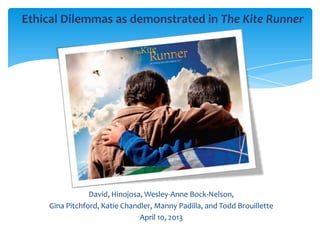Group movieproject kiterunner - Concordia MBA:Cohort 8
- 1. Ethical Dilemmas as demonstrated in The Kite Runner David, Hinojosa, Wesley-Anne Bock-Nelson, Gina Pitchford, Katie Chandler, Manny Padilla, and Todd Brouillette April 10, 2013
- 2. Background A tragic story of • Friendship • Trust • Jealousy • Guilt • Bullying • Betrayal • War But ULTIMATELY • Redemption
- 4. Ethical Decisions Amir Hassan and Baba Power to stop a tragic Hassan refuses to give up act, but avoids conflict. a trivial item (kite) Further damages victim because he made a to make the situation go promise away (avoidance) Baba protects a Gains redemption stranger, risking his own through risking his life life, because it is the right for the victim’s child thing to do
- 5. Relation to Daily Life
- 7. Outstanding Choices Your Decisions Can Impact Others
- 8. Consequences/Lessons Learned Poor Decisions have a Spiral Effect Guilt due to Actions as a Bystander Remaining Silent Own your Choices Value of Righting Wrongs Fairness & Equality Subjective Decision Making Moral Compass
- 10. References Horberg, W., Walsh, E.B., Yeldham, R., & Parkes, W.F. (Producers), & Forster, M. (Director). (2007). The Kite Runner [Motion Picture]. USA: Dreamworks.
Editor's Notes
- #5: Movie clip: This is the transition point from Amir’s poor ethical decisions to his redemption, where his behavior better reflects the influence of Baba and Hassan.Examples in slide: Contrast of Amir’s early poor ethical decisions and the better decisions he makes later in life, as well as the better decisions of Baba and Hassan that likely influenced Amir’s later moral fortitude.Discussion questions: Baba said that stealing is the only sin. Do Amir’s ethical decisions demonstrate sin? If so, are they a variation on stealing, as Baba says they must be?>Amir develops moral strength later in life. We do not see Baba as a child. Is it likely that Baba became such a strong moral influence because of consequences similar to Amir when he was young? Was he always morally strong?









![References
Horberg, W., Walsh, E.B., Yeldham, R., & Parkes, W.F.
(Producers), & Forster, M. (Director). (2007). The Kite
Runner [Motion Picture]. USA: Dreamworks.](https://image.slidesharecdn.com/groupmovieprojectkiterunner-130408093610-phpapp01/85/Group-movieproject-kiterunner-Concordia-MBA-Cohort-8-10-320.jpg)